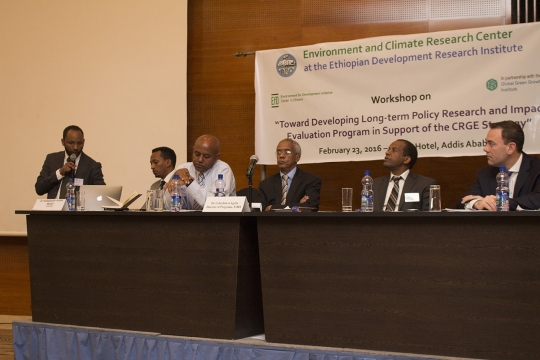The Ethiopian government’s goal is to become a middle-income economy by 2025, and to do so in ways that are climate resilient and environmentally sustainable. ‘These objectives are laid out in a formal policy – the Climate Resilient Green Economy (CRGE) plan’, said Dr Haileselassie Medhin, director of the Environment and Climate Research Centre (ECRC). ‘However, policy makers recognize that, to achieve this goal, they need help from researchers so that they can adopt evidence-based policies that get results when they are implemented in practice’.
To meet this need, ECRC researchers have drawn up an evaluation framework which can be used to assess projects done under the CRGE plan. When the ECRC presented this framework to key stakeholders in a workshop in February 2016, it was hailed by sector ministries and key development partners, who said it was timely and reflected the collaborative efforts of key stakeholders. The workshop, hosted by ECRC in Ethiopia’s capital, Addis Ababa, brought together high-level government officials, including an advisor to the prime minister, sector ministry officials, researchers, nongovernmental organizations, and international organizations such as the United Nations Development Programme (UNDP) and the World Bank.
Opening the discussions, Dr Tewolde Berhan Gebregziabher, former director of the Ethiopian Environmental Protection Authority (EPA), highlighted Ethiopia’s endeavors in addressing the climate issue and the efforts that the country has mapped out to strengthen the sustainable green development agenda. He recognized the efforts that the country is currently undertaking in areas of climate change, and emphasized the need to support these efforts with real-time research for policy makers, sectoral ministries responsible for implementing policies, and other actors.
Gebregziabher noted that Ethiopia is prone to climate variability, and that it needs a concerted effort to overcome these challenges. The impact of the current El Nino phenomenon would have been much worse if there had been no climate action in place, he said, underscoring that long-term evaluation is indispensable for the continuing usefulness of strategies like the CRGE.
ECRC researchers presented a five-year research plan, covering six broad areas, including sustainability in the areas of agriculture, water resources, energy transition, forestry, industrialization, and urbanization. Participants thoroughly discussed each detailed research plan, providing valuable feedback, suggestions and recommendations to further revise and fine-tune the structured research programs.
‘For the case of sustainable agriculture’, said Dr Alemu Mekonnen, senior researcher at ECRC, ‘our research plan emphasizes the need to assess the impact of climate change on the agriculture sector in Ethiopia, especially in terms of crop and livestock production and productivity in a changing climate, and disaster risk reduction and preparedness capacity’.
Similarly, ECRC’s water-related research points to the challenges of extreme hydrological variability (seasonal and year-to-year) and the international nature of Ethiopia’s most significant surface water resources. Ethiopia’s Growth and Transformation Plan (GTP) II envisages better water resource management, with specific goals and indicators. Therefore, ECRC will evaluate the impact of interventions in the water sector, as one of the thematic areas in its five-year research plan.
‘The green industrialization agenda was the focus area relating to sustainable industry’, said Dr Mulu Gebreyesus, senior researcher at EDRI. ‘Mainstreaming the green economy, the impact of industrial parks and greening micro and small enterprises in Ethiopia are the core research plans presented by the industry theme’.
In terms of urbanization, researchers focus on issues of employment, urban mass transport, and housing.
Two of the four pillars of the CRGE are related to energy. The first envisions the expansion of generation of electricity from renewable sources, and the second focuses on transition to energy efficient technologies. Research in this area will focus on rural electrification, improved cook stoves, the impact of biofuels, and energy modernization and efficiency.
‘Participants also raised issues concerning the prospective links with the relevant government bodies and how ECRC research outputs will get into the hands of the relevant stakeholders,’ added Dr Medhin. ‘In response, ECRC researchers highlighted the need for collaboration with all key stakeholders, noting the importance of sharing data and knowledge’.
‘The role of researchers is to indicate to stakeholders and policy makers what works and what does not, in terms of crafting new policy and improving any setbacks on previous measures’, concluded Dr Medhin. ‘Hence, the role of research centers such as ECRC in supporting the CRGE strategy of Ethiopia is paramount as a knowledge backstop’.
The ECRC is a partnership with the Swedish-based Environment for Development (EfD) initiative, the Global Green Growth Institute (GGGI) and the Ethiopian Development Research Institute, (EDRI), where it is based.
The Ethiopian government’s goal is to become a middle-income economy by 2025, and to do so in ways that are climate resilient and environmentally sustainable. ‘These objectives are laid out in a formal policy – the Climate Resilient Green Economy (CRGE) plan’, said Dr Haileselassie Medhin, director of the Environment and Climate Research Centre (ECRC). ‘However, policy makers recognize that, to achieve this goal, they need help from researchers so that they can adopt evidence-based policies that get results when they are implemented in practice’.
By: Yitatek Yitbarek
